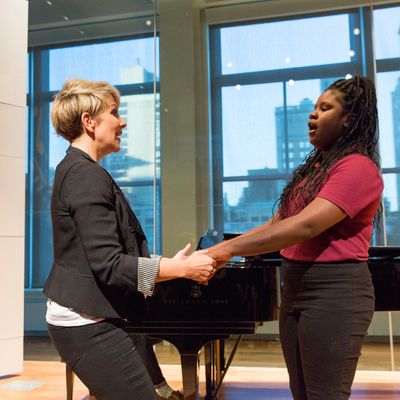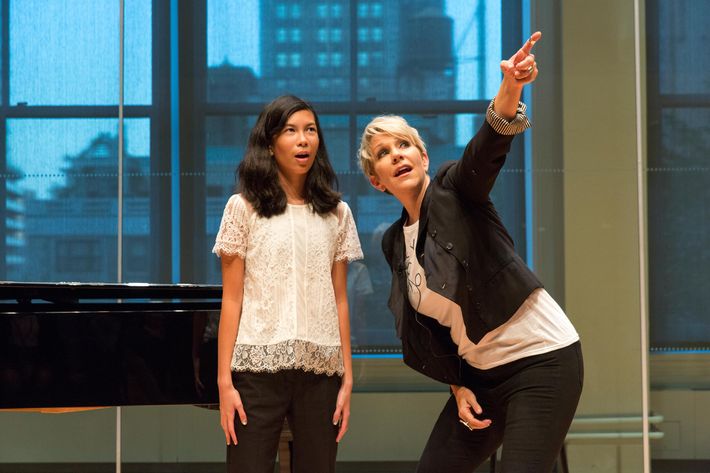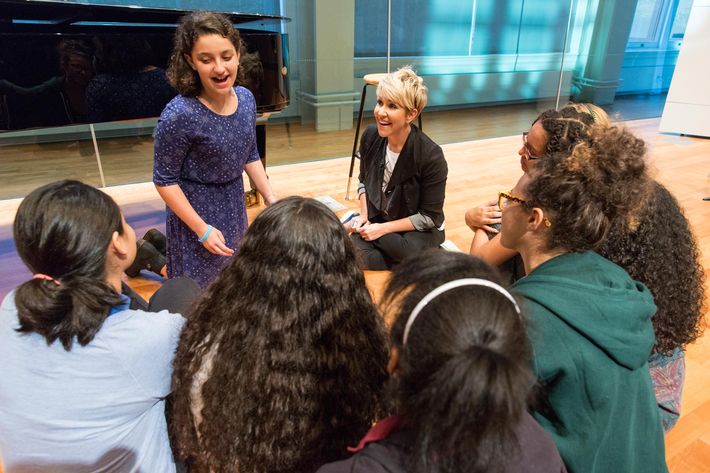
With a generous grin and a disarming pixie cut, Joyce DiDonato, one of the opera’s reigning divas, pops out in front of a crowd of nervous eighth graders and starts chipping away at their terror. The kids have gathered in Carnegie Hall’s Resnick Education Wing, where they’re getting some high-level help before they audition for New York’s selective arts-oriented high schools. DiDonato, a mezzo-soprano who was born in Kansas, seems slightly awed. “If you guys are sitting here, you’re miles ahead of where I was at your age,” she says. “It took me a lot longer to get to Carnegie Hall.” Over the next 90 minutes, I witness her coax real music out of four stiff swans. She dispenses homilies and epiphanies at a dizzying clip, and by the end of her session, each girl has grown suppler and sings with a truer, stronger voice. Maybe the effect will vanish on the way out the door, but I feel sure these girls will remember that feeling of effortlessness, of letting the notes waft through the room on a stream of controlled breath and disciplined joy. I do not trust myself to keep my composure.
To say that DiDonato, who is 47, is at the peak of her career is to do her an injustice: She’s at the peak of almost any singer’s career. Within a few years of her 2005 Metropolitan Opera debut, she had evolved into house star, and last season she got swooning reviews (from me, among others) for her performance of Rossini’s La Donna del Lago. She’s a Carnegie Hall regular too, giving recitals, conducting master classes for young professionals, headlining an annual workshop and performance with inmates at (of course) Sing Sing. Her newest recording, In War and Peace, an alternately scorching and consoling collection of 17th- and 18th-century arias, comes out on November 4.
At the moment, though, the rows of blank young faces prompt her to recount the time she desperately wanted a role in the high-school musical, even though she was only a freshman. She spent the summer memorizing and drilling “Wouldn’t It Be Loverly,” from My Fair Lady, as an audition piece. She raided her mother’s closet for a ragged flower girl getup, and had the lyrics down cold. “The first day of high school went pretty well: I didn’t fall down. The second was okay. On the third, I open the door to the audition room, and all the cool juniors and seniors are sitting there, and I go”— her eyes bug and her jaw drops, and she utters a startled squeak: “Oh! I guess I wasn’t supposed to come in costume. I was so embarrassed — I think the only reason they gave me a part in the chorus was because they felt so bad for me.”

The kids respond with sympathetic giggles. The first victim, Mimi, comes up to the piano with an effortful smile and sings “My Favorite Things,” from The Sound of Music. DiDonato grins warmly, then gets down to business, like a Midwestern Mary Poppins. “I know people like you: You learn quickly, you’re smart, you get good grades,” she says. “And once you have the song the way you want it, you’re going to get up there and hit the play button and sing it the same way each time. I want to feel like you’re making up the words on the spot and you’re finding the melody as you go. I want magic.”
DiDonato has other kids cluster and screech at Mimi’s feet, then orders her to placate them with words only, no singing. She kneels with them and heckles: “You like brown paper bags? What’s so great about bags?” A quick study, Mimi quickly absorbs what DiDonato wants — more verve, more variety — and it’s like watching a black-and-white image get suffused with color.
Each of the next three singers keeps her talents shut up in a cellar of anxiety, and DiDonato yanks them by turns around the stage while they sing, has them raise and drop their shoulders, straighten their spines, press against her hands, and move as if through water — anything to pry them out of that guarded adolescent slump. “You know, they have proven this, that if you stand in Wonder Woman pose for 30 seconds it actually gives you confidence,” she announces. She draws a musical line from one girl’s throat, backing away up the aisle to the rear of the room, always tugging gently hand over hand at the invisible thread. “Send it,” she exhorts. “Send it!”
If the class were an opera, its climax would come when a girl named Azaria announces, in a barely audible murmur, that’s she’s going to sing Domenico Scarlatti’s “O cessate di piagarmi.” It’s a tragic song, a paean to depression and death expressed in life-giving melody: Music offers a way out of despair. “Have you ever been heartbroken?” DiDonato asks. Azaria shrugs. “I have. I know what the song is about. It gives you a chance to voice, literally, something everyone in this room needs to hear.” Over the next 20 minutes, DiDonato unearths the girl’s big, gorgeous voice, and by the end of the short session, Azaria sounds like a different person. “Don’t go backwards,” DiDonato admonishes. “You’re going to set the world on fire when you let go. But it’s not about you. It’s about opening up and giving the world what it needs right now. That’s your job. Good luck.”

Afterward, energized by the contact with kids, she tells me that two years ago she gave up the opportunity to sing the national anthem before game six of the World Series, because she had committed to a similar children’s master class. (Fortunately, the Series went to game seven, and she got another chance.) “The thing about the voice is there’s nowhere to hide,” DiDonato she says. “It shows everyone what you’re thinking and feeling. Every one of these girls wants to sing their heart out, they want to be Beyoncé, but they have all these layers that stop them.”
I remark that while her empathy is obvious, hearing her now, with her Top Gun confidence and emotional high jinks, it’s hard to believe she was ever so muffled or timid. She laughs ruefully. “I remember the huge desire to sing but also the unspoken rule that you weren’t supposed to show it: Do it in a cool way, as if you didn’t care. I was the product of this Midwestern mentality of, Honey, let’s not do too much or be too loud.” Even through her college years, DiDonato never got a leading role and when, at 26, she landed a spot in the Houston Grand Opera studio, a program to ease singers from their student years to professional lives, her first day nearly ended her career.
“The voice coach said, Joyce, you’re clearly talented but there’s no future in the way you sing. You’re getting by on youth and muscle.” He informed her that she had about four years before her voice just gave out. Instead, she spent those years undoing all her habits and rebuilding her technique. “A lot of people were racing past me, but it was the best thing that could have happened to me, because when I landed, I was ready.”
Actually, DiDonato doesn’t need to reach back to her early days to understand what the kids are going through, because the struggle never ends. Vocal technique, she says, is a moving object, constantly darting out of reach like the Golden Snitch in Quidditch. “As soon as you think you’ve got it, it gets away.” The old tension at the back of the tongue keeps creeping back in, and DiDonato has to wage a perpetual battle for relaxation. Her task is the same when she’s working with young singers: to help them loosen up enough to discover something new. “I’m not interested in teaching opera. I’m more interested in getting people to surprise themselves, to have those lightbulb moments when they realize, I didn’t know I could do that.”


